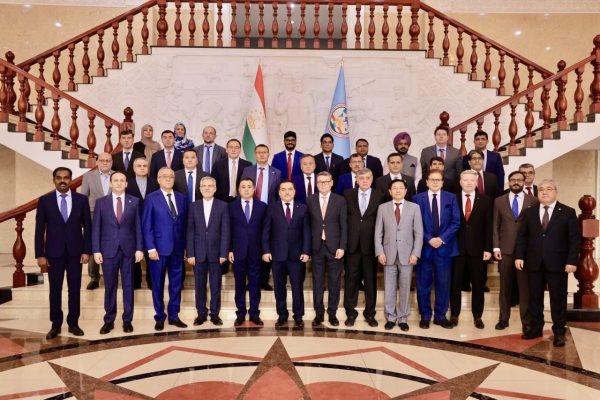By Muhammad Murad
Copyright thediplomat

Afghanistan is often referred to as the “Heart of Asia” because of its strategic location at the crossroads of Central and South Asia. This position has historically linked various civilizations and regions. Additionally, Afghanistan is connected to China via the narrow Wakhan Corridor. When Afghanistan experiences security challenges, these issues can have repercussions for its neighboring countries. Therefore, it is essential for these countries to collaborate in addressing these challenges or, at the very least, to mitigate their impact on their internal security. China and Uzbekistan recently held discussions in Tashkent regarding the current situation in Afghanistan, focusing on international efforts to address the ongoing challenges under the Taliban regime. The discussions between Yue Xiaoyong, China’s special envoy for Afghanistan, and his Uzbek counterpart, Ismatulla Irgashev, also concerned upcoming high-level events regarding Afghanistan. According to Uzbekistan’s Ministry of Foreign Affairs, the special envoys from both countries met to not only analyze the latest developments in Afghanistan but also to emphasize the importance of practical cooperation between Tashkent and Beijing concerning the situation in Afghanistan. The ministry stated, “The sides discussed the state of regional and international efforts to resolve the situation in Afghanistan and upcoming high-level events related to Afghanistan. The meeting was held in a constructive spirit and confirmed the mutual interest in further developing practical dialogue between Tashkent and Beijing.” Neither China nor Uzbekistan formally recognizes the Taliban regime in Afghanistan, but both have maintained political as well as economic contacts with the de facto regime. Before the bilateral meeting between China and Uzbekistan on Afghanistan last week, on August 26, Uzbekistan hosted a historic first meeting of the special representatives from the Central Asian republics on the situation in Afghanistan. It was an initiative of Uzbekistan in which representatives from other Central Asian states – Kazakhstan, Kyrgyzstan, and Tajikistan – also participated. As per Uzbekistan’s Ministry of Foreign Affairs, the meeting was held in order to develop regional cooperation and exchange viewpoints on crucial issues concerning Afghanistan. All participating countries jointly noted that it was of utmost importance to develop an effective approach to the Afghanistan issue, as the country is geographically close to them and they have cultural, historical, as well as economic ties with Afghanistan. The representatives also showed their commitment to developing a realistic and balanced approach to bring peace and stability to Afghanistan. Besides this, they also underlined that it was necessary to establish an independent and stable regional platform that represents the common interests and concerns of Central Asia. The group aims to meet regularly within the framework of the consultative meetings of the heads of the Central Asian states. These meetings served as a preamble to the Shanghai Cooperation Organization (SCO) consultative meeting on the Afghanistan issue, which took place in Dushanbe, Tajikistan, on September 11-12. The meeting was chaired by Tajikistan. During the consultative meeting, participants from the member states discussed the current situation in Afghanistan and its impact on the SCO region. In this regard, they “exchanged information on the interaction of member states with Afghanistan in ensuring security, stability, and sustainable development in that country, and also considered issues related to the functioning of the SCO-Afghanistan Contact Group.” This contact group was established in 2006 following the signing of a protocol in Beijing in 2005, with the aim of developing proposals and recommendations for cooperation between the SCO and Afghanistan on matters of mutual interest. Before the meeting, SCO Secretary-General Nurlan Yermekbayev had said that “engagement between member states and the Taliban administration on security issues would be on the agenda.” He further noted that “Afghanistan continues to face social challenges, restrictions on women’s rights and ongoing terrorist threats, and said SCO members share a consensus on these problems,” according to a summary of his comments by Afghanistan International. China and the Central Asian states, as members of the SCO, share common concerns regarding Afghanistan. These were also noted during the second China-Central Asia summit in June. During that summit, Chinese President Xi Jinping said during his keynote speech that “Afghanistan is our close neighbor. We should strengthen coordination to help the country boost its development capacity and achieve peace, stability, reconstruction, and development at an early date.” As neighbors to Afghanistan, both China and the Central Asian states have vested interests in the country, desiring a peaceful, prosperous, and stable Afghanistan. In addition to these interests, they are also drawn to Afghanistan’s rich natural resources. Although the recent Amu Darya oil deal between the Taliban and China has been canceled, Beijing remains a viable partner for the Taliban. However, the Central Asian states, particularly Kazakhstan and Uzbekistan, also serve as suitable partners for the Taliban. Reports indicate that the Taliban may extend an invitation to Russian companies to take on the oil project, especially since Moscow earlier this year officially recognized the Taliban as the legitimate government in Kabul. This recognition could encourage Russian investments in Afghanistan. Meanwhile, the geographical proximity of the Central Asian states makes them practical partners, as they understand the challenges that Afghanistan faces. However, under the current circumstances, it is unlikely that the Taliban can afford to completely distance themselves from China. Instead, the Taliban will likely aim to involve every possible state, including China, Russia and the Central Asian states, in the extraction of the country’s natural resources.



